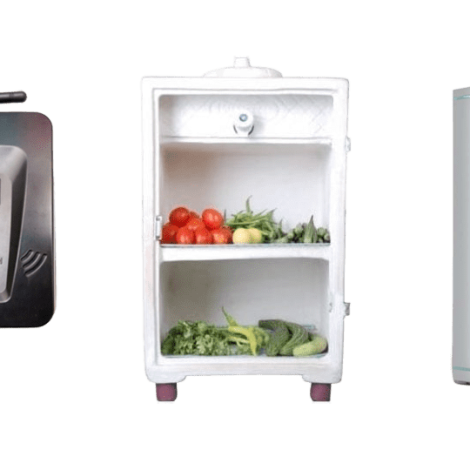Off-grid cold-chain technologies keep the important things cold in places where electricity and infrastructure are in short supply.
Natural disaster, chronic poverty and long distance from urban centers can each limit a community’s access to electricity. No electricity does not have to mean no refrigeration, however. Creative ideas for refrigeration have appeared in humanitarian relief efforts, the delivery of vaccines and other drugs for global health, and on farms to chill produce and reduce otherwise high post-harvest losses. These are ten examples of cold-chain solutions that save lives and increase food supplies worldwide.
For more technological solutions to difficult problems in global development, please see Engineering for Change’s Solutions Library.
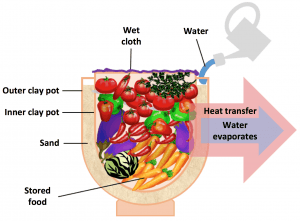 Clay Pot Evaporative Coolers
Clay Pot Evaporative Coolers
Food loss due to lack of effective storage is a global problem. In Sub-Saharan Africa, approximately 23 percent of available food is lost or wasted. One low-tech innovation accommodates poor power access and reduces post-harvest losses: the earthenware cooling pot. It operates on the principle of evaporative cooling; when water in the pot evaporates, energy is drawn from surroundings creating a local cooling effect. In hot environments, this technology can prevent foods from rotting prematurely at a fraction of the cost required to buy and run a full-scale refrigerator.
Affordable and Scalable: Evaporative Cooling Can Fight Food Loss – Time for Communities and the Development Sector to Embrace It
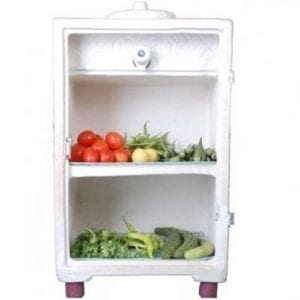 Mitticool Clay Refrigerator
Mitticool Clay Refrigerator
Mitticool builds on the principle of evaporative cooling with a more polished product, a ‘natural’ refrigerator made entirely from clay. The fridge cools its contents naturally without the need for electricity.Water from an upper chamber drips down the sides of the unit and evaporates, thereby removing heat from the inside out.
The fridge holds up to 50 liters of food and liquids and stays cool for 5-7 days after filling the water reservoir.
See Mitticool Clay Refrigerator in E4C’s Solutions Library
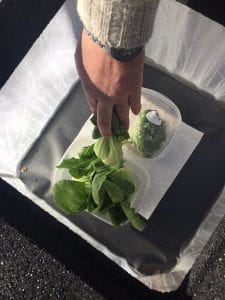 Evaptainers EV-8
Evaptainers EV-8
While Mitticool designed a home appliance based on evaporative refrigeration, Evaptainers took the concept in the opposite direction and built a portable evaporative cooler. The EV-8 is one of Evaptainers’ models designed for mobility. Sales are aimed at markets in Africa, and the company envisions uses that include everyday food storage as well as humanitarian cases in which they may store medical supplies.
With the EV-8 model, Evaptainers won the American arm of the 2018 American Society of Mechanical Engineers Innovation Showcase (iShow).
See EV-8 in E4C’s Solutions Library
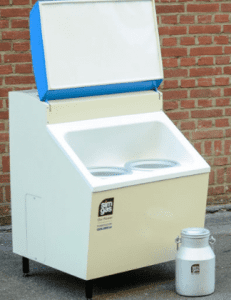 Simgas Biogas Milk Chiller
Simgas Biogas Milk Chiller
The Biogas Milk Chiller keeps milk cold on smallholder dairy farms, even those that are off the power grid. The unit is powered with biogas, a naturally produced combustible gas captured during the decomposition of waste such as kitchen scraps, cuttings from farms and gardens and human and animal waste.
For more on biogas, see Biological Waste to Biogas: A Solution to Self-Sustainable Energy in Rural India
SimGas’ milk chiller enables off-grid dairy farmers to store, deliver, and sell the highest possible quantity of milk. It decreases milk spoilage and increases income on dairy farms. The Biogas Milk Chiller can cool 2.5-10 liters of milk down to 35ºC to 4ºC within 3 hours, meeting international standards.
The device was a finalist in the Kenyan arm of the 2018 ASME iShow.
See Simgas Biogas Milk Chiller in E4C’s Solutions Library
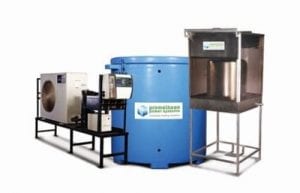 Promethean Rapid Milk Chiller
Promethean Rapid Milk Chiller
Unreliable electricity that cuts out for hours each day may be a step up from no grid access at all, but it can spoil food just the same. intermittent power renders traditional refrigeration nearly useless, both by spoiling perishables inside, and through wear and tear, decreasing lifetime usability. The Promethean Rapid Milk Chiller is designed to work in such environments, targeted at Indian dairy farms that endure scheduled daily blackouts.
The unit plugs into the power grid and stores energy for use when the grid is down. If it can tap 4-5 hours of grid energy each day, Promethean stores enough power in its thermal battery to chill 210 liters of milk per hour. It can store and cool 500 liters or much more with optional 1100-liter milk storage containers that can add on in a modular design.
See the Promethean Rapid Milk Chiller in E4C’s Solutions Library
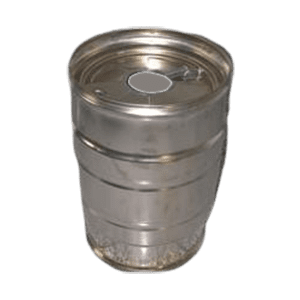 Thermogenn Cooler
Thermogenn Cooler
One more product rounds out the milk chillers on this list, this one chosen for its interesting blend of power and cooling methods. Thermogenn Cooler is a prototype in development by William Kisaalita, who is distributing it in a pilot phase to Ugandan dairy farmers. Thermogenn’s novelty lies in its materials and how its power source is used. It is a milk canister inside a cylinder filled with water. A highly absorptive mineral called zeolite draws the water out of the cylinder and cools the canister through evaporation. To speed the process, the zeolite must be dried by heat.
Thermogenn sees propane as the most viable source of heat, since there is already a supply chain set up for the fuel. But Kisaalita has been encouraged by the World Bank and potential investors to experiment with biogas digesters, as these have positive climate change benefits and can generate carbon credits.
See Thermogenn Cooler in E4C’s Solutions Library
In a similar class, Coolar is another startup’s prototype that operates on much the same principle as Thermogenn. The refrigerator cools its contents through the evaporation of water, and absorbs water with a medium that must be heat dried. In Coolar’s case, however, the power source for drying the absorptive material is solar PV panels. Coolar’s other big difference is its target market. The fridge is aimed not just at farmers and consumers wishing to keep produce chilled, but also at global health practitioners and medical centers that need to cool vaccines.
See Coolar in E4C’s Solutions Library
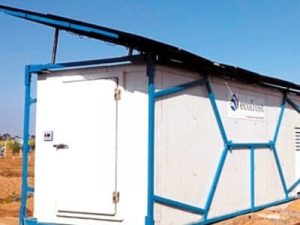 Eco-Frost Micro Cold Storage
Eco-Frost Micro Cold Storage
Solar power is essential to a large segment of the off-grid cold chain, both on farms and in healthcare. Our first entry in the solar category is a walk-in cold storage unit for farms. The EcoFrost Micro Cold Storage, built in India, can house 5-6 metric tons of produce. Each unit is designed to accommodate a single smallholder farmer. And one perk that has nearly become a necessity these days: It can be monitored and operated remotely through an Android app.
A bank of 2.5-3.5KW solar PV panels powers the unit, and excess energy is stored thermally, rather than in conventional batteries. Fully charged, the units can last up to 36 hours through nighttime and cloudy weather.
See Eco-Frost Micro Cold Storage in E4C’s Solutions Library
Eco-Frost is not without competition. Another contender in the walk-in class is ColdHubs, modular solar-powered cold rooms for produce that were co-engineered with the German Society of Refrigeration and Air Conditioning.
See ColdHubs in E4C’s Solutions Library
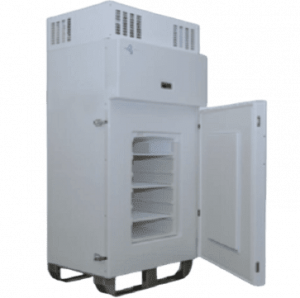 Sure Chill Vaccine Refrigerator BLF100 DC
Sure Chill Vaccine Refrigerator BLF100 DC
Vaccines must be kept at a Goldilocks temperature that is not too hot, but also not so cold that they freeze. Sure Chill refrigerators regulate their temperature and prevent freezing by surrounding vaccine vials with cold water. Water is densest at 4°C, so as it freezes, the ice rises and the dense water settles. Sure Chill places vaccines in the base of a chamber of water that allows ice to rise and dense, 4°C water to settle and surround the vaccines. When the power supply is switched off, warming water rises and the ice at the top melts, drifting to the bottom to surround the vaccines as it approaches 4°C. That action keeps the contents of the storage compartment in a vaccine-safe range of 4-5°C. It also means that this solar fridge can operate even when the sun is not out without need for a battery.
The fridge uses a 200-370W solar array, depending on the geographical location where it is used. It can hold up to 99 liters and can keep vaccines cool for up to 10 days in 32°C ambient temperature without power.
See Sure Chill Vaccine Refrigerator in E4C’s Solutions Library BLF100 DC
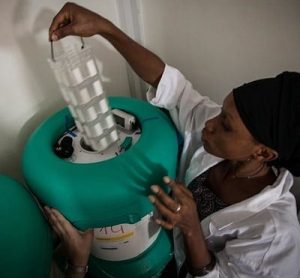 Arktek Passive Vaccine Storage Device
Arktek Passive Vaccine Storage Device
Intellectual Ventures Lab built a vaccine container that stretched the simplest principle of keeping things cold to an extreme limit using advanced materials and digital technologies. That simple principle is that ice keeps things cold. More capable than a the typical ice cooler for picnics, however, the Arktek Passive Storage Device maintains a temperature of 0-10°C for a minimum of 35 days on a single load of ice. That minimum time holds true even in blistering 43°C day time ambient temperatures. With monthly ice replacements, Arktek can store 300 vaccine doses to serve a community of 6000 people. The device achieves that level of performance with vacuum insulation technology that allows for repeated opening and closing to remove or store vaccines. Arktek also monitors its internal temperature, tracks its location using GPS and transmits its data through a USB connection or SMS messaging.
See Arktek Passive Vaccine Storage Device in E4C’s Solutions Library
Cold Chain Accessories: Remote monitors and camel-back transportation
Completing our list of ten off-grid cold chain technologies, these are two accessories that protect and deliver cold materials while not actually cooling anything themselves.
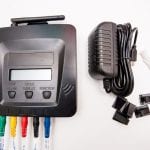 Nexleaf ColdTrace 5
Nexleaf ColdTrace 5
The remote monitoring specialists at Nexleaf have created a wireless remote temperature monitor for vaccine refrigerators. It collects data and generates reports. And when it detects an emergency, it sends an SMS alert.
See Nexleaf ColdTrace5 in E4C’s Solutions Library
Camel-Back Bamboo Frame for Solar Vaccine Fridges
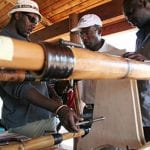 Winston Soboyejo and his (now former) students of mechanical and aerospace engineering at Princeton University experimented with camel-borne, solar-powered refrigerator designs to supply clinics in rural Kenya. The team built frames from bamboo and tested them on camel volunteers at the Bronx Zoo in New York, New York (USA). The frames were built to carry an Engel portable solar refrigerator comfortably around the hump on an East African camel’s back.
Winston Soboyejo and his (now former) students of mechanical and aerospace engineering at Princeton University experimented with camel-borne, solar-powered refrigerator designs to supply clinics in rural Kenya. The team built frames from bamboo and tested them on camel volunteers at the Bronx Zoo in New York, New York (USA). The frames were built to carry an Engel portable solar refrigerator comfortably around the hump on an East African camel’s back.
